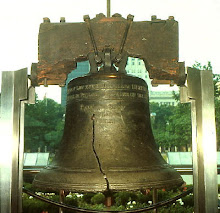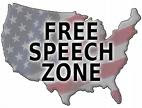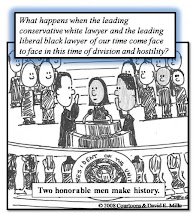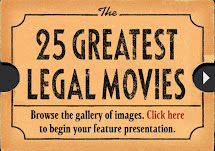 Judge Julius the Unjust
Judge Julius the UnjustGreat piece by Martha Neil at the ABA Journal; just had to post and link to it. A talented writer reaches back. You know, they say if you can remember what happened in 1969 than you were not there. But it just is not true. The fact is that I can remember more vividly episodes of my life from 1969 than 1979 or 1989, and I think it was because it was an era and decade that had meaning and purpose; causes I still cherish today.-NK
A perfect storm of political unrest, generational conflict and a biased judge set the stage for a 1969 trial that is still memorable 40 years later for its drama and iconic import, participants in an American Bar Association panel told a standing-room-only audience Tuesday.
Although the months-long Chicago Seven conspiracy trial ignited international debate—one searing image was of a bound and gagged Bobby Seale, originally the eighth defendant in U.S. v. Dellinger, et al.—panelists offered a behind-the-scenes glimpse of little-known aspects of the high-profile trial. Brought against activists who participated in anti-Vietnam War protests at the Democratic National Convention in 1968, the federal case offered an opportunity for defendants including Tom Hayden, Abbie Hoffman and Jerry Rubin to create a media circus and they took full advantage of it.
The effort was aided by a trial judge who offered a substantial target for criticism at the best of times and for this case was "the worst possible judge," recounted partner Thomas Sullivan of Jenner & Block, who was then a young lawyer in Chicago. Baited viciously by defendants and counsel, U.S. District Judge Julius Hoffman eventually handed down hefty contempt terms that were reversed on appeal.
From the outset, however, Hoffman clearly favored the prosecution, according to Sullivan and other panelists. After Seale's intended lawyer was stricken with a gall-bladder attack three days before the trial was to begin, Hoffman scoured the pleadings to identify other attorneys who had entered an appearance in the case on Seale's behalf for peripheral purposes. Finding four, the judge sent a court marshal out to locate the lawyers and bring them in to defend Seale, briefly jailing two attorneys who didn't come in voluntarily, Sullivan said.
When the four lawyers, represented by Sullivan, told Hoffman they weren't adequately prepared to try the case, he attempted to jail all four over the weekend until another judge intervened.
As the case progressed, a parade of celebrity witnesses took the stand, noted journalist Rich Samuels, who presented a program on the trial for a local news affairs program Chicago Tonight. They included folk singer Judy Collins and Timothy Leary, a well-known fan of the drug LSD who had earlier taught psychology at Harvard University.
Following months of trial that stretched into 1970, the jury was deadlocked. But a verdict was finally reached after a court official told holdouts that the judge could keep them in the courthouse until they rendered a decision. "That terrified them," said John Schultz, who covered the entire Chicago Seven trial as a reporter for the Evergreen Review and has written a book about the case.
Jurors were originally unwilling to talk about the verdict, but Schultz persevered and his coverage helped point the way toward a successful appeal.
Although widely viewed as an incendiary factor in an out-of-control trial, Hoffman himself initially saw the Chicago Seven case as a high point in his career and was proud of having played an important role in it, said Jeffrey Cole, a federal magistrate and adjunct law professor who as a young attorney was involved in the appeal. "He thought this was a turning point in the history of the whole country."
Repeatedly invited by Hoffman to discuss the case, post-trial, in the wealthy jurist's exquisitely furnished chambers, Cole noted that the judge had framed the few newspaper articles that took a favorable view of the trial. After being criticized by the 7th U.S. Circuit Court of Appeals for his handling of the case, however, Hoffman eventually died "a very disappointed and horribly unhappy man," Cole said.
For more details, take a look at the full ABA Public Program Series broadcast, which can be downloaded next week on an ABA web page about the Chicago Seven conspiracy trial program. It was sponsored by the ABA Division for Public Education and moderated by Edward Adams, editor and publisher of the ABA Journal.
I am going to look this up and read more. Wish I had known about the conference. Would have been there. Kicking myself now.
































No comments:
Post a Comment